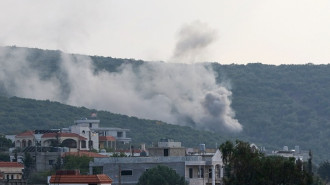Israeli settlers dig graves to threaten Palestinian Bedouin community in Jordan Valley
Israeli settlers continue to harass Palestinian Bedouin communities along the eastern slopes of the occupied West Bank's central hills overlooking the Jordan Valley in an area known as the 'Muarrajat' zone.
Earlier this week, Israeli settlers dug graves marked with flowers in the land of the Mleihat community in the Muarrajat, between the eastern hills of Ramallah and Jericho, as a "symbolic" threat.
"Settlers dug graves of small sizes, as if for children near the community and placed flowers on them, as a way of threatening the families to leave the community", Abu Mousa Kaabneh, a resident of the community, remarked to The New Arab.
"This is not the first time, since 7 October, settlers have increased their harassment, herding their sheep beside and between our houses, threatening to kill us if we don't leave and hanging dolls stained with fake blood on the community's school, which includes 80 children from 1st to 9th grades", he said.
"Before 7 October, we used to receive demolition orders by the occupation army, and we suffered several demolitions, but since 7 October, it is the settlers who have taken the role of pushing us out by harassment and aggression", added Kaabneh.
Maarjat, Jericho |
— Younis Tirawi | يونس (@ytirawi) January 23, 2024
Israeli settlers digged symbolic graves for children near Al-Ma'rajat primary school as a threat.
According to locals in the area, Israeli settlers threatened earlier locals from reaching this area and stated “if you approach the area, you may get killed” pic.twitter.com/FOFuTEbBzH
"We can't herd our sheep in the open anymore because settlers assault us constantly, and now we are depending on buying food for the sheep, which increases the cost," he said. "Eventually, we will be forced to sell our livestock and lose our capital, and our only choice for livelihood then will be to sell our labour in the settlements and, of course, leave the area and move to the towns and cities".
Since 7 October, Israeli settlers have forcibly expelled most of the Bedouin communities in the Muarrajat area. The largest expulsion was that of the Wad Al-Seeq community on 12 October, where some 40 families were forcibly removed in a single day.
The families expelled from Wad Al-Seeq continue to live provisionally in the outskirts of the eastern Ramallah villages. In November, they told TNA that many of them are selling their livestock to earn cash for daily living.
Last Saturday, the 'Al-Baidar Organisation For The Defence Of Bedouin Rights' said in a statement that they had monitored 1,124 Israeli settler attacks on Bedouin communities in the occupied West Bank.
The attacks include direct physical attacks, razing of lands, destruction of crops, property stealing and establishing new settler outposts on the communities' lands.
On Monday, the Israeli human rights' Yesh Din' organisation said that a study they conducted showed that only 6 per cent of the settler attacks against Bedouin communities in the occupied West Bank that were probed by Israeli police ended in charges. According to the human rights group, around 94% of the cases were closed without indictment, indicating a 'deliberate policy'.
The study looked into cases of settler attacks probed by the Israeli police between 2005 and 2023. Israeli media reported that the Israeli police did not respond to requests for comment.
Israeli settlers' violence has been openly encouraged by some Israeli officials, especially since 7 October. In the few days following 7 October, Israeli security minister Itamar Ben-Gvir announced a plan to distribute 10.000 rifles to Israelis, including settlers in the occupied West Bank.
In late December, Israel's attorney general said that Ben-Gvir issuing licences to purchase firearms by settlers was "illegal" according to Israel's laws.
Around 75,000 Israeli settlers live in Israel's settlements throughout the occupied West Bank. According to international law, all Israeli settlements in the West Bank are illegal, as per the 4th Geneva Convention.





 Follow the Middle East's top stories in English at The New Arab on Google News
Follow the Middle East's top stories in English at The New Arab on Google News

![Algeciras port [Getty]](/sites/default/files/styles/image_330x185/public/75377010.jpeg?h=327453ef&itok=KfCFUEza)
